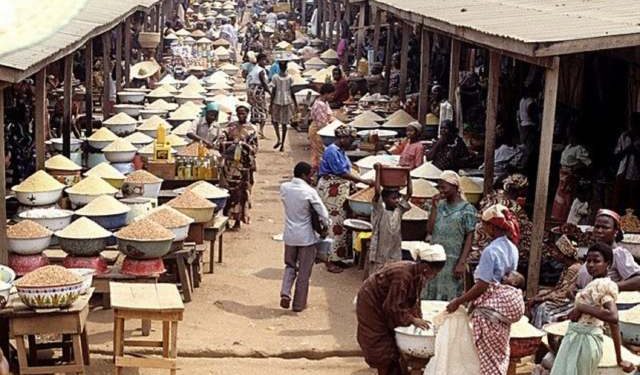
Despite the numerous challenges faced by Nigerian citizens, ranging from issues of insecurity, incessant killings of innocent people by armed bandits and kidnappers, bad road network, lack of basic social amenities, Corona virus pandemic, the recent endSARS protest where lots of federal and state properties where destroyed by alleged hoodlums etc.
Nigerians are now experiencing and groaning under the heat of major hike in the prices of foodstuffs which have gone up by 100 per cent especially in the South-West markets.
Upon Interrogations by news sources most respondents attributed the increase in the prices of foodstuffs to aftermath and effects of the global COVID-19 pandemic that ravaged and brought many world economies and businesses to a standstill.
Many others however, blamed the recent increase in the hike in the price of fuel which made many road transport workers to increase fares of transportation. As a result of this many farmers needed to increase the price of their farm produce which they had to transport at exorbitant prices from their farmland or villages to major cities.
There is also the issue of border closure a decision made by the FG to checkmate incessant importation of foreign products and increase patronage of locally produced good. Also it was a decision made in line with the Corona virus regulations.
Despite the good intentions of the FG on border closure its disadvantages have also contributed to the hike in prices of foodstuffs because there is also the problem of the inability of farmers to produce enough food for domestic consumption.
Major stakeholders expressed their worries over the prevalence of this continuous increase, and implored the FG to quickly intervene before the situation gets out of control and creates more devastating effects to the already ailing nation’s economy.
The hike in foodstuffs is telling more on factories and companies who engage in using some of these foodstuffs in processing beverages and other household groceries. Some of the major foodstuffs particularly hit by the price hike include rice, beans, onion, maize, millet, sorghum, tomato, pepper, palm oil and yam.
NAN’ too a cursory survey at the Ota market in Ogun state and its findings revealed that the price of onions for instance has doubled within the last one month. It was also observed that the prices of yam followed a similar pattern, as a dozen of big yam, which was sold for N4,800 in October, is now between N9,000 and N10,000.
Some traders reacting to the current situation said that they sell their products and foodstuffs according to the way they buy and transport them.
Mr Saheed Ismaila, a yam seller at the popular Shasha market in Akure North Local Government Area of Ondo State said that;
“We are selling based on how much we bought the item. We usually travel to Minna and Abuja to buy them and we have to add the cost of transport, hence the price increase,” Ismaila said.
Mrs Toyin Adams, who sells palm oil at Shasha market, Akure, said that a 25 – litre keg of palm oil, which used to cost N11,000 about a month ago, is now sold for N13,500.
“Only God knows what the future holds for foodstuff prices in the country,” Adams lamented.
It was gathered that before the COVID-19 pandemic, a 25-litre keg of palm oil was sold between N8,000 and N9,000 in many markets in the South-West. Although, the commodity increased to N12,000 shortly after the pandemic, it is now sold for N14,000 in most markets in Ogun.
At the popular Kuto market in Abeokuta, a bag of beans, of which the price fluctuated between N19,000 and N23,000 in October, is now sold for N28,000, while a plastic measure of the foodstuff has increased from N350 in October to N550 in November.
Rice, however, maintained a fairly stable price, as a bag of 50kg, which was sold for N22,000 in October is now sold for N23,000 at most of the markets in Ogun, with a plastic measure hovering between N700 and N800, up from the N600 it was sold in October.
The price of Garri however, according to the survey was noticed to be on a downward trend in the prices as that of tomato and pepper in some of the markets.
There’s the subtle fear though amongst marketers and consumers that prices of foodstuffs may likely spike up as the yuletide approaches and this will make life more unbearable and difficult for most Nigerians especially when the recent events and experiences of the year are put in perspective.
Gift Joseph Okpakorese
Staff Writer







